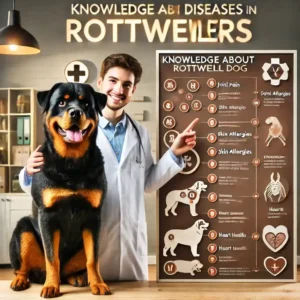Introduction
Getting a Rottweiler into the home is a rewarding adventure. These trustworthy and smart dogs make great friends, but demand special care to succeed. We will explore six vital factors of proper pet care for Rottweilers. We also cover everything from food to training and grooming. We will preach some frequently asked questions to help you become a familiar and responsible Rottweiler owner.
1. Nutrition and Diet
Understanding Rottweiler Dietary Needs
Rottweilers are large and firm dogs with specific health needs. A balanced diet and high-quality protein is essential for rottweiler health. Vitamins and minerals are crucial for a rottweiler’s overall well-being.
Suggested Feeding Schedule
Selecting a regular feeding schedule helps regulate Rottweiler’s digestive system and can help in housebreaking. Typically, adult Rottweilers should be fed twice a day, while puppies require more frequent meals.
Avoid Harmful Foods
Food like chocolate, grapes, and onions can be harmful to dogs. It’s essential to educate yourself about these harmful substances and confirm they are never available to your Rottweiler.
Obesity Prevention
Rottweilers are prone to obesity due to their size and slower metabolism. Regular exercise is vital to control obesity-related health issues.
2. Exercise and Activity
Meeting Their Exercise Requirements
Rottweilers are an active breed that thrives on physical activity. Daily exercise, including walks, playtime, and mental stimulation, is essential for their physical and mental well-being.
Mental Stimulation
Engaging your Rottweiler’s mind is just as important as physical exercise. Puzzle toys, training sessions, and interactive games can provide mental stimulation, preventing boredom and destructive behavior.
Socialization and Playtime
Rottweilers are generally affectionate and enjoy interacting with both people and other dogs. Regular socialization helps them develop positive behavior and ensures they are well-adjusted and confident in various environments.
3. Training and Socialization
Basic Obedience Training
Basic commands like sit, stay, and come are fundamental for a well-behaved Rottweiler. Consistent training using positive reinforcement techniques builds a strong foundation for further obedience.
Socializing with Other Dogs and People
Exposing your Rottweiler to different environments, people, and other dogs from a young age helps prevent fear or aggression toward unfamiliar situations.
Consistent Discipline and Positive Reinforcement
A balanced approach to discipline is essential. While it’s important to correct unwanted behavior, positive reinforcement for good behavior is equally crucial for a happy and well-adjusted Rottweiler.
4. Grooming and Hygiene
Coat Care
Rottweilers have short, dense coats that require minimal grooming. Regular brushing helps remove loose hair and promotes a healthy, shiny coat.
Nail Trimming
Routine nail trims prevent discomfort and potential injuries. Familiarize your Rottweiler with the process from a young age to make it a stress-free experience.
Dental Health
Oral hygiene is often overlooked but critical for overall health. Regular brushing, dental chews, and professional cleanings can prevent dental issues down the line.
Bathing Schedule
Rottweilers are relatively low-maintenance when it comes to bathing. Aim for a bath every 2-3 months, or as needed, to keep them clean and comfortable.
5. Healthcare and Veterinary Visits
Vaccinations and Preventive Care
Regular veterinary visits are crucial for vaccinations and preventive care. This ensures your Rottweiler is protected against common diseases and health issues.
Common Health Issues in Rottweilers
Being aware of breed-specific health concerns, such as hip dysplasia and heart conditions, allows for early detection and treatment.
Recognizing Signs of Illness
Knowing the signs of illness or discomfort in your Rottweiler enables prompt action. Regular check-ups and open communication with your veterinarian are key.
6. Love and Attention
Bonding and Building Trust
Spending quality time with your Rottweiler fosters a strong bond and trust. Engage in activities they enjoy and offer plenty of affection.
Mental and Emotional Well-being
Addressing your Rottweiler’s emotional needs is equally important. Pay attention to their behavior and provide a loving, stable environment.
Quality Time and Affection
Rottweilers thrive on human interaction. Regularly spending time with them, showing affection, and providing positive reinforcement strengthens your relationship.
1. What are the essential things to know about caring for a Rottweiler?
Rottweilers require regular exercise, proper training, socialization, a balanced diet, grooming, and routine veterinary care to thrive.
2. How much exercise does a Rottweiler need?
Rottweilers are active dogs that need at least an hour of exercise daily, including walks, playtime, and mental stimulation to prevent boredom and maintain their health.
3. What kind of training is suitable for Rottweilers?
Rottweilers benefit from consistent, positive reinforcement training to channel their intelligence and strength effectively. Basic obedience, socialization, and behavior management are crucial.
4. What dietary requirements do Rottweilers have?
Rottweilers should be fed a high-quality, balanced diet suitable for their age, size, and activity level. It’s essential to monitor their weight and avoid overfeeding to prevent obesity, a common issue in the breed.
5. How should Rottweilers be groomed?
Rottweilers have a short, dense coat that requires regular brushing to minimize shedding and keep their coat healthy. They also need regular nail trimming, dental care, and ear cleaning to prevent infections.
6. What health considerations are important for Rottweilers?
Rottweilers are prone to certain health issues like hip dysplasia, heart conditions, and obesity. Regular veterinary check-ups, vaccinations, and preventive care are crucial to detect and manage any health concerns early.
7. How should Rottweilers be socialized?
Early and ongoing socialization is key to preventing behavioral problems in Rottweilers. They should be exposed to various people, animals, and environments to help them become well-adjusted and confident adults.
8. Are Rottweilers good family pets?
Yes, with proper training and socialization, Rottweilers can be excellent family pets. They are loyal, protective, and affectionate towards their families, making them great companions when raised in a loving environment.
9. How can Rottweiler owners manage their dog’s energy levels?
Providing adequate physical exercise, mental stimulation through interactive toys and training, and creating a structured routine can help manage a Rottweiler’s energy levels effectively.
10. What should Rottweiler owners know about the breed’s temperament?
Rottweilers are known for being confident, alert, and protective. Early socialization and training are crucial to ensure they develop into well-behaved dogs who know how to differentiate between friend and foe.











